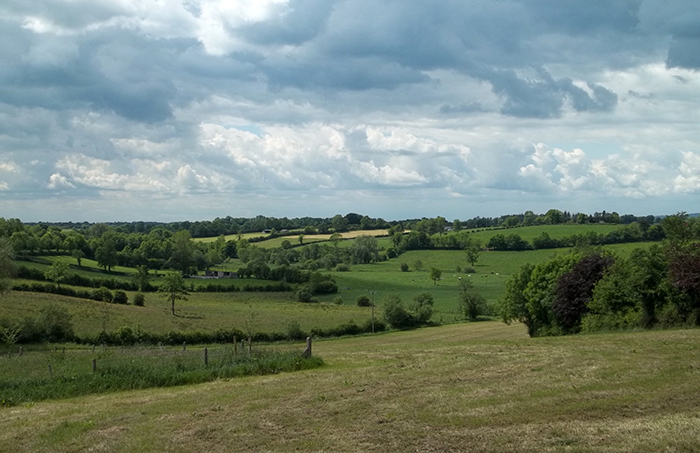I’m sure most of you know the song “Danny Boy.” It’s almost impossible to turn on the radio on Saint Patrick’s Day without hearing it. The song’s sorrowful lyrics and air struck a chord with Ireland, and it is often considered an anthem of Irish descendant communities. I have always found this slightly ironic given that it was written by an Englishman. Despite this, it is illustrative of a larger theme in traditional Irish music: the immigrant experience. These songs often express nostalgia for the homeland, stories behind the choice to emigrate, and hope for the future.
Oh, Danny boy, the pipes, the pipes are calling
From glen to glen and down the mountain side
The summer’s gone and all the flowers are dying
It’s you, it’s you, must go and I must bide
Emigration is an important chapter of Ireland’s history. The Irish began emigrating across the Atlantic in the eighteenth century, with numbers steadily increasing during the mid-nineteenth century, and skyrocketing when Ireland’s Great Potato Famine struck. Over two million Irish emigrated between 1845 and 1855. Before the famine, the country’s population was over eight million, but by 1851 it had shrunk to six million due to starvation and emigration. Its current population is estimated at 6.4 million (including Northern Ireland), as emigration continued at a steady pace until roughly 1921.
The Irish diaspora had a deep effect on both Ireland and its now scattered population. Those who emigrated were often never seen again by their families. It became common for families to hold an “American wake” for those about to leave, for once they left they were unlikely to return. At these gatherings, families and communities could say a final goodbye. For many families, it seemed as though they were raising children for emigration. My own great-great-grandmother watched all six of her children leave for America, one after the other, in the early twentieth century.
The impact of the diaspora on Ireland comes through in the country’s music. I have always found that the melodies in Irish music have the ability to intertwine joy, sadness, hope, and loss all in a single tune. The songs of immigration often combine a sense of loss, hope, and resilience. In “The Green Fields of Americay,” the narrator goes back and forth between the sadness of leaving and the hope for what the new country will bring.
Farewell to the groves of the sweet County Wicklow,
Likewise to the girls of old Erin around;
May their hearts be as merry as ever I wish them,
Although far away on the ocean I’m bound.
At the end he offers a promise to future Irish immigrants: he will welcome as best he can in his “own habitation in Americay.” This shows the lasting connection Irish immigrants felt to their homeland, a connection they did their best to pass down to future generations.
This inherited connection is also present in “Skibbereen, a Ballad of the Famine.” The song is a dialogue between a father and son. The son asks why his father left Ireland, and the father tells him about the crop failing, the landlord evicting them, his mother dying, and how he left for his son’s sake. In the last stanza, the son tells his father that one day the Irish will rise against their oppressor, and he will be a part of the fight. You can hear how the trauma of the famine could be passed down to the next generation and how, despite not knowing a country, the next generation can still feel a connection to its struggles.
Oh, father dear, the day will come when for freedom we will call,
When Irishmen in Ireland will rally one and all.
I’ll be the man to lead the gang beneath Erin’s flag of green,
And low and high we’ll raise the cry of dear old Skibbereen.
Other songs speak to the experiences of those who stayed in Ireland. “Oro Milhe Gradh/ Oro My Thousand Treasures” was originally a herding song but took on the added meaning of a “farewell song.” In the album’s liner notes, a woman recalls this song being sung when family members left for America and the sorrow felt.
The theme of immigration is present in modern Irish music as well. Contemporary Irish folk singer Damien Dempsey addresses Irish immigration experiences in his song “NYC Paddy.” “Livin’ in America” by the Celtic rock band Black 47 addresses the immigrant experience, as does “Thousands Are Sailing” by the Pogues:
Thousands are sailing a cross the western ocean
To a land of opportunity t hat some of them will never see
Fortune prevailing a cross the western ocean
Their bellies full, t heir spirits free
They’ll break the chains of poverty
And they’ll dance
Folk music is often a form of oral history, retelling the stories of families, communities, and generations. For diasporic communities, these songs serve as a reminder of their ancestors’ hardship and a way of expressing their heritage. In Ireland I think they are a reminder of those who left and a way of explaining an important part of Irish history. While these songs are about the Irish experience, the sense of loss, hope, and resilience they express are universal to the immigrant experience worldwide.
Alexandra S. McKeever is a web production intern at the Center for Folklife and Cultural Heritage. She has a B.A. in anthropology and Portuguese-Brazilian studies from Smith College, where she was a member of the Celtic music group the Wailing Banshees.


